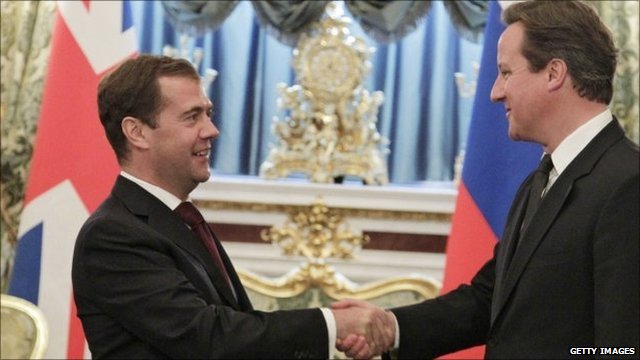 David Cameron has raised the Alexander Litvinenko case at the start of his bridge-building visit to Russia.
David Cameron has raised the Alexander Litvinenko case at the start of his bridge-building visit to Russia.
Relations between the UK and Russia have been strained since the Russian dissident was murdered in London in 2006, and Russia then refused to extradite the prime suspect.
The PM said in Moscow that the UK would continue to push for Mr Litvinenko's killer to be brought to justice.
The one-day trip is the first by a UK leader for talks in Russia since 2005.
Mr Cameron admitted in his speech at Moscow State University that there were "difficult issues that hamper mutual trust and co-operation" between the UK and Russia.
'Differences exist'
"We still disagree with you over the Litvinenko case. Our approach is simple and principled - when a crime is committed, that is a matter for the courts," he said.
"It is their job to examine the evidence impartially and to determine innocence or guilt."
Mr Cameron said victims and their families had a "right to justice".
"It is the job of governments to help courts to do their work and that will continue to be our approach," he added.
"So we can't pretend these differences don't exist. We need to keep working for an honest and open dialogue to address them candidly.
"But, at the same time, we have a responsibility to recognise the many ways in which we do need each other, to end the old culture of tit for tat and find ways for us to work together to advance our mutual interests."
Mr Cameron said he wanted a "new approach based on co-operation".
And the prime minister spoke in Russian when he told his audience of students: "We are stronger together."
Mr Cameron later held a joint news conference with Russian President Dmitry Medvedev in which he said they had agreed to strengthen co-operation in a number of areas, including commerce, technology and international issues.
Asked by the BBC's James Landale whether the Litvinenko issue had been "parked" in the interests of trade, Mr Cameron said: "We don't agree with each other about this issue, and it's an important issue to the United Kingdom, I'm not downplaying it in any way.
"It remains an issue between Britain and Russia. We haven't changed our position about that and the Russians haven't changed their position.
"But I don't think that means we that freeze the entire relationship. What we should do as two mature and sensible countries is try and see if we can build a relationship that's in our mutual interest covering important areas that will help us both.
Mr Medvedev said the legal traditions of different countries should be respected and that under the Russian constitution it was impossible for a Russian citizen to be extradited to a foreign country to stand trial.
"This will never happen whatever the circumstances," he said.
The focus of Mr Cameron's visit to Moscow is on strengthening business links and improving the prospects for UK firms operating in Russia.
BP chairman Bob Dudley is among 24 senior executives from the UK in the travelling party. The visit is expected to result in £215m of deals, creating about 500 jobs in the UK.
Mr Cameron is set meet his Russian counterpart Vladimir Putin, who could take over at the Kremlin again after elections next year.
The diplomatic row following the death of Mr Litvinenko has resulted in Mr Putin not having any substantive discussions with a British minister or official for more than four years.
Speaking before travelling to Moscow, Mr Cameron said Russia was an "important partner" for the UK.
"Although our differences in recent years are well known, we face many similar challenges and both the president and I believe that we can make more progress by working together on matters of real importance for the prosperity and security of people in both countries," he said.
BBC Moscow correspondent Daniel Sandford said although the trip was a sign of a defrosting of relations, "it is not a complete thaw".
Downing Street has made it clear that the Litvinenko case will be raised at some point during the visit.
Outspoken critic
Mr Litvinenko's widow, Marina, told the BBC's World Today programme she wanted to see those responsible for her husband's death brought to justice because until then "we will not have a normal progress of the relationship between these countries".
"It's not just for me, it's for our son, it's for my family and all our friends. I think it is very important," she said.
Mr Litvinenko, an outspoken Kremlin critic and former security official who had moved to the UK, was fatally poisoned with radioactive polonium-210 in 2006. His death led to both the UK and Russia expelling diplomats.
Moscow has refused a long-standing request from the UK to extradite the prime suspect in the case, Andrei Lugovoi. He is a former KGB officer who is now a member of the Russian parliament and has always denied involvement.
Ahead of the visit, in a letter to the Sunday Times, the prime minister was urged by four former foreign secretaries to challenge President Medvedev over a perceived failure to protect business against corruption and to address the Litvinenko issue.



